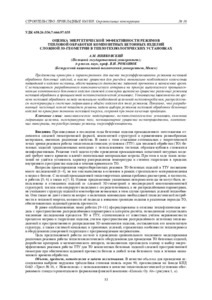Please use this identifier to cite or link to this item:
https://elib.psu.by/handle/123456789/24406| Title: | Оценка энергетической эффективности режимов тепловой обработки композитных бетонных изделий сложной 3D-геометрии в теплотехнологических установках |
| Authors: | Нияковский, А. М. Романюк, В. Н. Niyakovski, A. Romaniuk, V. |
| Other Titles: | Assessment of the Energy Efficiency of Heat Treatment Modes of Composite Concrete Products of Complex 3d-Geometry in Thermal Technical Installations |
| Issue Date: | 2019 |
| Publisher: | Полоцкий государственный университет |
| Citation: | Нияковский, А. М. Оценка энергетической эффективности режимов тепловой обработки композитных бетонных изделий сложной 3D-геометрии в теплотехнологических установках / А. М. Нияковский, В. Н. Романюк // Вестник Полоцкого государственного университета. Серия F, Строительство. Прикладные науки. - 2019. - № 16. - С. 53-58. |
| Abstract: | Предложены критерии и характеристики для оценки энергоэффективности режимов тепловой обработки бетонных изделий, а также уравнения для расчёта минимально необходимого количества подводимой к изделию теплоты, обеспечивающего достижение заданной прочности в назначенное время. С использованием разработанного математического аппарата на примере выпускаемого промышленностью композитного бетонного изделия сложной геометрии выполнено сравнение различных режимов тепловой обработки в промышленной теплотехнологической установке. Установлены зависимости от времени тепловой обработки между минимально необходимой величиной теплопотребления, распределением температуры и степенью гидратации в объёме изделия для этих режимов. Показано, что разработанный численный метод позволяет решать задачи выбора режимов тепловой обработки бетонных изделий по критерию экономии тепловой энергии, сохраняя при этом качество продукции.= The criteria and characteristics for assessing the energy efficiency of the modes of heat treatment of concrete products, as well as equations for calculating the minimum required amount of heat supplied to the product, ensuring the achievement of a given strength at the appointed time, are proposed. With the use of the developed mathematical apparatus on the example of a composite concrete product of complex geometry, which is produced by industry, a comparison of different modes of heat treatment in an industrial heat-technological installation is performed. As a result of the calculations performed for these modes, the relationship between the minimum required value of heat consumption, the temperature distribution and the degree of hydration in the volume of the product depending on the time of heat treatment is established. It is shown that the developed numerical method allows to solve the problem of choosing the modes of heat treatment of concrete products according to the criterion of saving thermal energy while maintaining the quality of products. |
| Keywords: | Государственный рубрикатор НТИ - ВИНИТИ::ТЕХНИЧЕСКИЕ И ПРИКЛАДНЫЕ НАУКИ. ОТРАСЛИ ЭКОНОМИКИ::Строительство. Архитектура Математическое моделирование Теплотехнологические установки Кинетика гидратации цемента Температурное поле Нестационарное уравнение теплопроводности Композитные материалы Энергосберегающие режимы Энергоэффективность Mathematical modelling Thermal technical installations The kinetics of cement hydration Temperature field Transient heat conductivity equation Transient heat conductivity equation Composite materials Energy-saving modes Energy efficiency |
| URI: | https://elib.psu.by/handle/123456789/24406 |
| metadata.dc.rights: | open access |
| Appears in Collections: | 2019, № 16 |
Items in DSpace are protected by copyright, with all rights reserved, unless otherwise indicated.
